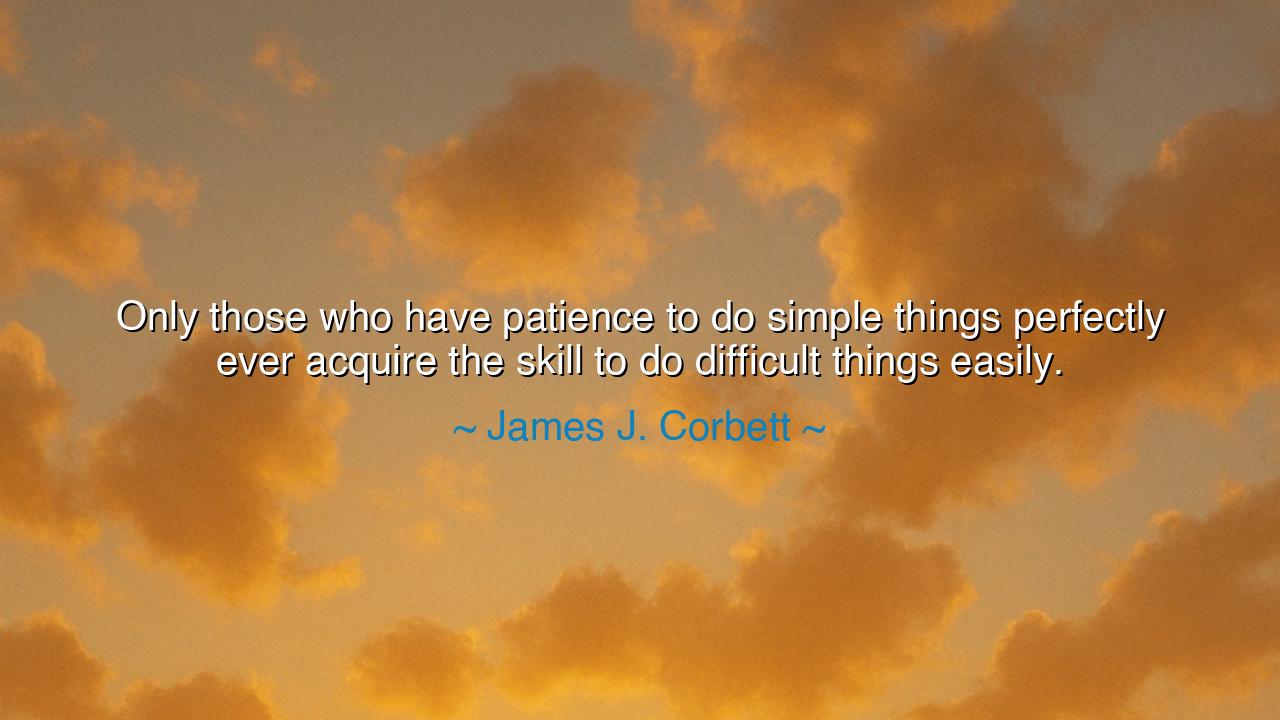
Only those who have patience to do simple things perfectly ever
Only those who have patience to do simple things perfectly ever acquire the skill to do difficult things easily.






The words of James J. Corbett—“Only those who have patience to do simple things perfectly ever acquire the skill to do difficult things easily”—resound like the steady beat of a drum in the march toward mastery. They remind us that greatness is never built upon sudden flashes of brilliance, but upon the quiet, persistent labor of discipline. The path to the difficult lies always through the simple. He who ignores the small task, who rushes to glory without first honoring the humble foundations, will stumble when confronted with true challenge. But he who trains the hand and mind to shape the simple with patience will, in time, rise to the difficult with ease.
The origin of this wisdom lies in Corbett’s own life as a boxer. Known as "Gentleman Jim," he was the man who dethroned the mighty John L. Sullivan, the last bare-knuckle champion. Corbett was not only a fighter of strength but of technique, precision, and patience. He knew that victory did not come merely from brute force, but from mastering the basics—footwork, timing, defense—until they became second nature. It was his mastery of the “simple” things that allowed him to face the “difficult” challenge of defeating a legend. From the ring he drew a truth that reaches far beyond sport: mastery begins with patience in the small.
History is filled with echoes of this lesson. Consider Leonardo da Vinci, who spent years sketching the muscles of the hand, the curve of a smile, the mechanics of a bird’s wing. To some, these studies seemed trivial, almost childish obsessions. But it was precisely because he studied and perfected the “simple” details that he could later paint the mysterious depth of the Mona Lisa or design machines centuries ahead of his time. What looked effortless was born of endless patience in the small things.
Or think of military discipline in ancient Sparta or Rome. Soldiers were not first trained in complex maneuvers or grand strategies. Instead, they learned to march in step, to polish their armor, to hold a shield steady. The perfection of these simple tasks prepared them for the chaos of battle. When the difficult came, they met it with ease, for they had been trained in patience, precision, and obedience to the smallest detail. Thus, the humble drills of the camp paved the way to the victories of the battlefield.
There is also a spiritual truth within these words. Many people desire the mountain summit but despise the first steps of the climb. They long for wisdom, but scorn the discipline of study. They crave mastery, but resist repetition. Yet the soul is shaped not by leaps but by steady strokes, as stone is worn smooth by flowing water. Patience in the simple is the secret door to the magnificent. Without it, the difficult remains forever out of reach.
The lesson for us is clear: do not despise small beginnings. If you wish to achieve greatness—whether in art, in craft, in work, or in life—honor the simple things first. Sweep the floor well before you build the house. Write the sentence well before you attempt the book. Practice the single note perfectly before you attempt the symphony. In time, your patience will make the difficult appear effortless, and others will marvel at the grace you gained through quiet labor.
In practice, this means embracing the small tasks of daily life with seriousness and care. When you work, give yourself fully even to what seems trivial. When you study, do not rush past the basics, but master them. When you train, repeat with patience, even when it feels dull. For every repetition is a stone laid in the foundation of greatness. Remember: the cathedral is built of countless small bricks, each placed with care.
So let Corbett’s words echo as a call to endurance: “Only those who have patience to do simple things perfectly ever acquire the skill to do difficult things easily.” Take joy in the simple tasks, for they are the seeds of mastery. With patience, the hand that once struggled will move with grace, and the mind that once strained will see with clarity. Then the difficult will bow before you, and what seemed impossible will become natural, for you will have built your strength upon the quiet perfection of the small.






AAdministratorAdministrator
Welcome, honored guests. Please leave a comment, we will respond soon